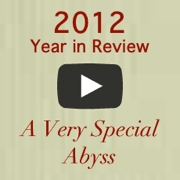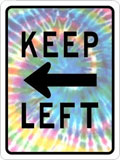https://twitter.com/#!/shoutabyss/status/150969352492023809
https://twitter.com/#!/shoutabyss/status/150970074113642496
Just go ahead and ignore my snide little partisan joke at the end there. 🙂 What do you think? Am I right? Wrong? For that matter, what is right and wrong? What would you do?
Do we really live in the “let him die (laughter)” era? Is that really the proper way to behave? Or should we take care of other life whether we feel it “deserves” it or not?
Can we morally and ethically explain away the consequences of doing nothing and still be sure our ticket to heaven is nicely punched?
Is doing nothing at all any different than doing the deed yourself?
I have no answers. Only many questions. And this vague feeling that you probably shouldn’t feel too secure in your position if you choose to sit in your warm house, surrounded by your food, and watch someone die. Or is that just me?






















I’m not sure either my friend. My mind goes all “fuzzy” when the discussion turns to things like Heaven and Hell. But I think my moral code must be defined by what’s in my rational self-interest, and letting others die when I can help just doesn’t seem to fit the bill…
LikeLike
I just added a comic to this post. Scroll up.
It occurred to me that the ant and the grasshopper story is a pretty unique concept in within our culture. (Even though the story itself is much older than the United States.)
The moral of the story is simple. If you don’t work, don’t have a job and don’t “produce” then you don’t deserve life. Your behavior makes it acceptable for others to stand by and do nothing and watch you die.
During a Republican debate recently people cheered (fucking cheered) the sentiment: “Let him die.” So I naturally asked myself, “Those are people who think they are going to heaven. I wonder if God would agree?”
Heaven and Hell are merely an allegory for right and wrong, for the morals of our society. Clearly we place a lot of value on the concepts of work and self-sufficiency, but what of the morals of hoarding wealth and remaining idle while someone dies?
When I say I find this concept unique, what I mean is that we don’t go to this sort of extreme in other situations. Imagine a single vehicle accident. We see a car upside down. We see a person trapped inside. What do we do? We run to help in any way that we can. We don’t stop and say, “Hey. Maybe this idiot deserved it! Were they texting? Drunk? Reading a book? If so, maybe we should let them die!”
Apparently the concept of “deserving” life vs. death is a situational type of thing.
LikeLike
Oh I understood where you were coming from my friend. And since those right-winged-dingbats like to too his name around so much I suggest they ask themselves “what would Jesus do?” I’m no expert when it comes to quoting the bible, but I found this with a very quick search:
“The special identity of Jesus with the poor is reflected in His parable of the sheep and goats. We will be judged upon our treatment of “the least” of the Lord’s brethren; yet the description of “the least” brethren exactly match the Lord’s own experience in His death- one who is imprisoned (Mt. 26:50), sick (Mt. 27:26), naked (Mt. 27:35), thirsty (Mt. 26:29; 27:48), friendless like a stranger (Mt. 26:56). In responding to “the least” of the Lord’s brethren, we are responding to His cross. For our brethren, in their poverty, nakedness and imprisonment, are fellowshipping the sufferings of their Lord.” – The Poverty Of Jesus
LikeLike
Have you gone completely bonkers?
LikeLike
I wish. Gee, wouldn’t that be so nice? At least for the one who is bonkers? Perhaps not so much for the ones who have to change his diapers.
LikeLike
People who are so certain of their position are a hairs breadth from being the ones their friend turn the thumbs down upon. Add a little misfortune and they become those they disdain.
LikeLike
When I hear the story of the ant and grasshopper (which I saw some pinhead on FOX News using recently) I think, “Wow. That ant sure is an asshole.”
Some want to hold the ant up as some kind of hero. They want to say, “The ant is doing the right thing. The grasshopper should get what he deserves.”
What we don’t know about the ant is the richness of his life. How well rounded is he? What else of value does he contribute to society? Does he work all day, and for what purpose? Nothing but his own wealth? Does he help others? Give to charity? Or just see how many boats he can own to water ski behind? Is he a good person?
Ultimately I believe the ant and grasshopper story fails because it is too simple. If the ant is an asshole to begin with, then what? The Bible speaks at great length against excess wealth and that we should love each other as ourselves. And that we should not judge. How does the story reconcile against that? Isn’t letting someone die when you could prevent it the ultimate form of judging?
LikeLike
LikeLike
Thanks. That looks awesome. Will watch ASAP.
LikeLike
It’s really a great question. Is there — and should there be — a limit to mercy? There’s sort of a “The Lord Helps Those Who Help Themselves” component to American charity, isn’t there — as though someone needs to be “worthy” of being helped.
From an societal altruistic standpoint, is there also a limit to how many people it is practical to help before you start to undermine the whole shebang?
Like you, i don’t have any answers.
LikeLike
That’s certainly what I’ve always been taught. But I remember Sunday sermons about the rich having a small chance of getting into heaven, too. Something about a camel and the eye of a needle?
I agree that too much of anything is bad, and someone does have to work or society would be markedly different. I’ve always maintained, though, that even if society provided minimal existence to those who do absolutely nothing of “value” there would still be those who wanted something more and would be willing to work and excel to get it.
It’s like Americans and food. With more food there are more fat people, yet some people still find a way to resist and be fit.
I think it would be something like that.
I also don’t think most people, even rich assholes, are as callous as the ant. It’s easy to say that you believe that in theory but quite another matter to do nothing and watch someone die. Sure, a lot of us innately have that inside, but call me “optimistic” on this one. I think when the chips are down they’d still save that life, belief system or not.
LikeLike